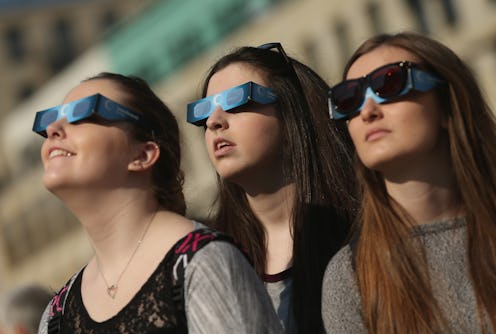
By now, you've likely heard of this little thing called a "solar eclipse" that's happening Aug. 21 and has the collective public freaking out in the best possible way. After all, space stuff is cool, and this event in particular is especially fascinating — it's the first time in almost 100 years that an eclipse's path of totality will cross the United States coast to coast. But if you're planning to catch this sky show when it goes down on Monday, you're going to need the right equipment, and stores that sell solar eclipse glasses are already starting to run out of supplies, fast. So, if you are looking for ways to protect your eyes, it might be time to come up with a backup plan.
And before you even think about it, no — a regular pair of sunglasses will not keep you safe. Your favorite sunnies might be great for blocking out harmful UV rays during most days, but sunglasses aren't going to protect your eyes from being thoroughly fried if you decide to check out Monday's eclipse. It sounds dramatic, but it's true; you risk burning your retinas and other types of scary, sometimes permanent eye damage if you choose to watch the solar eclipse without proper eye protection.
What kind of protective glasses are you looking for specifically, then? According to the American Astronomical Society (AAS), eclipse viewers should use glasses with "special-purpose solar filters" that are "verified to be compliant with the ISO 12312-2 international safety standard for such products." In case that sounds like gibberish, the AAS also provides this handy list of vendors and retail chains selling eclipse glasses that meet international safety standards, but be warned — most places are likely completely sold out by now.
That doesn't mean you're out of luck, though. Here are a few things you can still do to protect your eyes so that you can enjoy Monday's eclipse in its full glory.
Call Local Stores And Vendors
Although the AAS warns that most places selling eclipse glasses are likely out of supplies, it still doesn't hurt to call local branches of the stores and vendors listed by the AAS to see if they have any left in stock. You never know — there might be a few extra pairs sitting in a box in the back somewhere.
Make A Pinhole Camera
If you can't find a pair of verified glasses, it may be time to get a little crafty. Making a pinhole camera only requires minimal supplies: two pieces of cardboard, and tin foil. To start, cut a square hole in the middle of one of your cardboard pieces, and then cover the hole with tin foil. Then, poke a tiny hole in the center of the tin foil. Hold your piece of cardboard with the tin foil over your other piece of cardboard, and position yourself so that the sun is behind you. The reflection that shows up is that of the moon crossing the sun. Check out these full instructions from the NASA Jet Propulsion Laboratory. Just remember that you should never try to view the sun directly through the pinhole camera — you're just using it to cast a shadow.
Try Other Methods Of Pinhole Projection
Don't have five minutes to make a pinhole camera? The AAS lists other ways to experiment with pinhole projection, like by lacing your fingers together and standing with your back to the sun. If you look down at the ground through the shadow your fingers make, you can see what shape the sun is taking. The same trick works if you stand under a tree and look down at the ground through the shadows the leaves make, too. You can find full instructions here.
Stream The Eclipse
You can also just watch the solar eclipse from the comfort of your couch if you want. NASA will be streaming the entire thing, as will timeanddate.com.
Monday's solar eclipse is definitely going to be a cool event, but frying your corneas to catch a glimpse just isn't worth it. Be cautious of people giving away solar eclipse glasses for free — if they're not from a place listed on the AAS website, it's probably not a good idea to risk it. If you are able to find verified eclipse glasses that meet international safety standards, keep them in a safe place between now and Monday so that they don't get scratched or damaged in any way. And whatever you do, don't look directly at the sun. I know, I know — we've been over this. But trust me, it's not something you want to mess with.